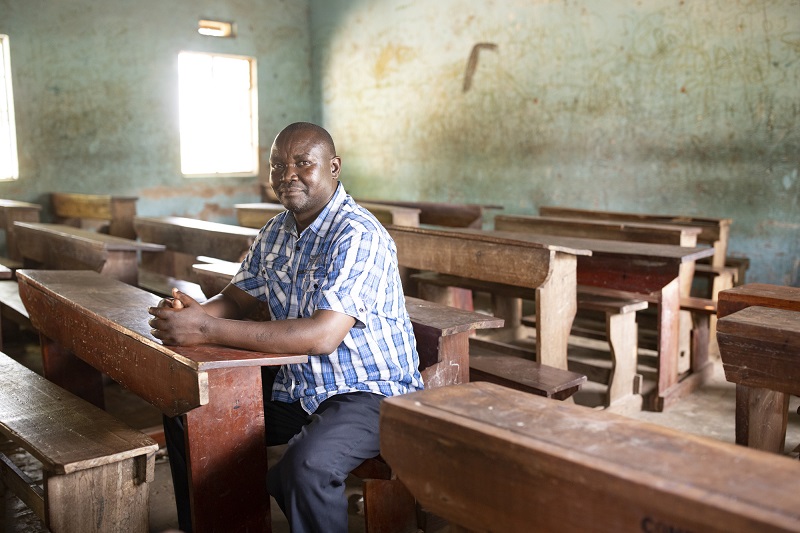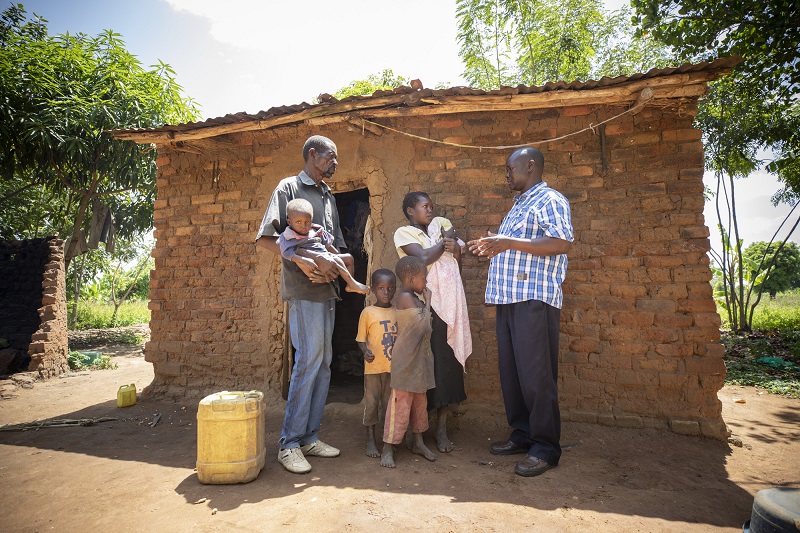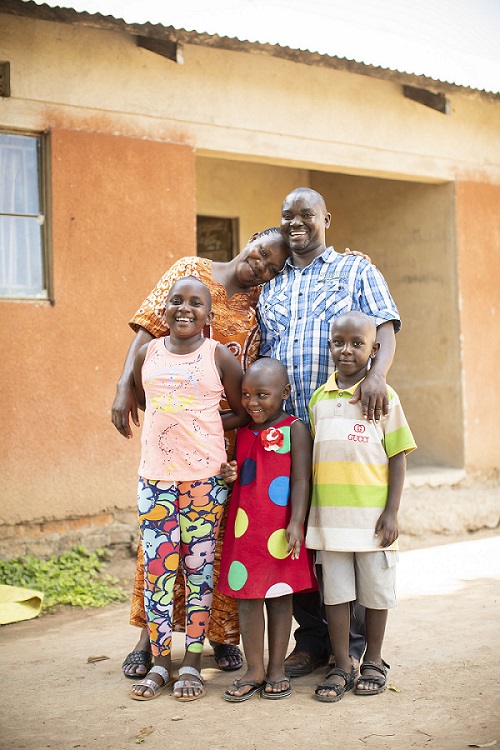Site will be
unavailable for maintenance from June. 4, 11:30 p.m., to June 5, 12:30 a.m. ET. Thank you for your
patience!
Child sponsorship changes the story for Phanuel
Posted on 01/20/2022
When he thinks about his life before 1982, Phanuel Mwami – proud father, social worker and leader of his own community development organization in his hometown of Busaba, Uganda – remembers mostly the fierce hunger for an education. He was 11 years old the first time he saw the inside of a classroom.
“I had lost hope of going to school,” he says. In those days, education was not free or compulsory in rural Uganda, even for young children. His own parents, subsistence farmers who grew cotton and other crops on a small plot of land, had never had any formal schooling, and Phanuel was the sixth of nine children in their family.
“My father could not even buy a single book or a single pencil for us,” Phanuel says. There were more immediate things to worry about than education: food, clothing, basic shelter. Their house, for one, had been in need of basic repairs for years. “When it would rain, one of our older sisters would tell us to hold the walls of the house so they would not fall on us,” he says.
Phanuel remembers that level of extreme need as a waking nightmare. “I feared the abject poverty we were living in,” he says. Resources were stretched so thin that one little thing – one heavy rain, one minor illness, one skipped meal too many – could mean the end of everything. “I could have died because of lack of essential services,” he says.
But it was 1982: the year that changed everything. Although his challenges were nowhere near over, the trajectory of Phanuel’s life was about to shift in a big way. And it all began the first time he heard the name of a total stranger who had decided to sponsor a child in Uganda: Bernard James.
Child sponsorship and education

Phanuel Mwami, 48, sits in the classroom at the school he attended as a child, which was built and supported by ChildFund (then Christian Children’s Fund). “I am what I am because of ChildFund,” he says.
“I was extremely happy,” Phanuel says of the time he was enrolled and sponsored through ChildFund. Shortly after, he began attending a primary school ChildFund had built using sponsorship funds. It was there he learned to read and write for the first time.
Every now and then, Phanuel would get letters from Mr. James that encouraged him to stay in school. But the incentive was already built in: The school provided uniforms, books, supplies and, most importantly, a midday meal.
“I didn’t give up on my studies because at school we would get a uniform, we would get lunch, everything was free,” he says. And because children had to be accountable to their sponsors, they never skipped class.
“By building that school, ChildFund supported almost the whole community,” he says. Phanuel remembers attending workshops on children’s rights, participating in trainings on sanitation and hygiene, and getting critical childhood immunizations all at the school. It quickly became the hub of community life and the center of his small world.
Hard times at home
Although he was several years behind, Phanuel was bright and thoroughly enjoyed going to class, advancing quickly through the grades. But at home, the situation was getting worse. His father struggled with alcohol abuse and frequently became violent. In 1985, Phanuel’s mother left, taking his other siblings with her.
“I would have joined my mother, but I had one fear,” Phanuel explains. “The fear was, if I went with my mother, I would not go back to school.” He knew that if he left the community, the ChildFund program couldn’t follow him – and losing his place in the sponsorship program might mean losing access to his education. “So I stayed,” he says. “I’d do anything to be sitting at a desk and learning with other children my own age” – even if it meant going hungry.
“There is an African proverb that says, ‘A home without a mother is a desert,’” Phanuel says. In his father’s house, the proverb proved to be true. His father’s family, bitter about having to care for him, regularly refused him food, saying it was his mother’s job to feed him. He remembers watching his cousins eat and being treated as an outcast in his own family. Every morning before school, he had to get up early to do excessive chores – tending the garden, walking long distances to collect water. “If I did not do as instructed, I would be chased away from home,” he says. “I was almost the only person I could talk to.”
Phanuel lived for school days, when he could go to class and get a meal from ChildFund. But on the weekends, he was on his own. He remembers long days picking through the garbage for scraps of food. “I had to devise a means of surviving,” he says, in the absence of supportive family members or child protective services. (ChildFund has since developed and strengthened community-based child protection programs that aim to protect children like Phanuel from abuse and neglect.)
The mental stimulation from his classes and emotional support from his sponsor kept him going. Eventually, Phanuel began selling snacks like soybeans, groundnuts and sweet jackfruit on the roadside to make his own cash. When he graduated with high marks from the ChildFund-supported primary school, he used the money he had saved to pay his own way through secondary school until, finally, an educated woman on the school board took notice of him and his academic gifts. She brought him to live with her in nearby Mbale town, putting an end to the hardest struggles of his life. His sponsor, too, continued to send support, purchasing a goat for him that proved to be a tremendous source of financial aid.

Phanuel speaks with a family enrolled in his community development organization. “I was raised up in the hands of good Samaritans,” Phanuel says. “I started the initiative to give back to the community in appreciation of the individuals and organizations that supported me.”
Child sponsorship ‘enabled me to live the life I always dreamed of’
Phanuel excelled in secondary school and then at university, winning scholarship after scholarship and eventually earning his degree in Sociology and Social Administration. He went on to pursue a lengthy career in social work, working with children, prisoners, HIV/AIDS patients and all kinds of vulnerable people.
“For me, after going through what I went through, I said, ‘There is another child who is facing what I was facing,’” Phanuel says. In 2010, Phanuel launched his own nonprofit in the same community in Busaba where he grew up. The organization now supports more than 100 local children to access education and resist early marriage, a practice that continues to be common in the community.
Through it all, he has never forgotten how it felt to be so vulnerable himself, living for school and the subtle but strong feeling that at least a stranger cared about what happened to him.
“I don’t want any child under my care to experience what I experienced, going to the market and picking through garbage,” he says. “ChildFund made sure there were no obstacles regarding my education. Sponsorship opened up my opportunities. It enabled me to live the life I always dreamed of, and now, I am dedicating my life to helping others.” Through his hard work, Phanuel now helps support his entire family, including a host of nieces and nephews and his aging father.

Today, Phanuel is married with four children of his own. “What I went through, I don’t want them to go through,” he says. “My first 10 years were horrible. I didn’t have any hope that I would go to school. Now, I’m trying to do all that is possible to support my children.”
Phanuel hasn’t had contact with his former sponsor for decades. But when we ask him what he would say to the American named Bernard James who chose to sponsor a child in Uganda back in 1982, he still doesn’t hesitate.
“You advocated for me,” he says. “The investment you made in me is paying off. The spirit of giving to those in need was inculcated in me because someone very far away believed in me. You gave me the gift of a brighter future.”
Loading...


